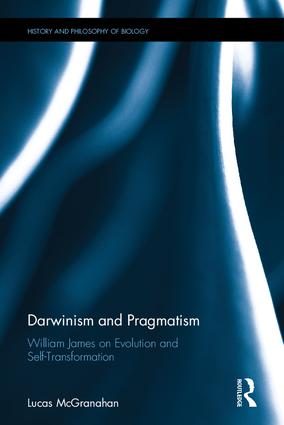Dr Lucas McGranahan received his degree from UC Santa Cruz in 2012 and is a Development Writer at the University of Chicago. His new book Darwinism and Pragmatism: William James on Evolution and Self-Transformation is part of Routledge's History and Philosophy of Biology series (edited by Associate Professor Rasmus Grønfeldt Winther).
Description
Charles Darwin’s theory of natural selection challenges our very sense of belonging in the world. Unlike prior evolutionary theories, Darwinism construes species as mutable historical products of a blind process that serves no inherent purpose. It also represents a distinctly modern kind of fallible science that relies on statistical evidence and is not verifiable by simple laboratory experiments. What are human purpose and knowledge if humanity has no pre-given essence and science itself is our finite and fallible product?
According to the Received Image of Darwinism, Darwin’s theory signals the triumph of mechanism and reductionism in all science. On this view, the individual virtually disappears at the intersection of (internal) genes and (external) environment. In contrast, William James creatively employs Darwinian concepts to support his core conviction that both knowledge and reality are in the making, with individuals as active participants. In promoting this Pragmatic Image of Darwinism, McGranahan provides a novel reading of James as a philosopher of self-transformation. Like his contemporary Nietzsche, James is concerned first and foremost with the structure and dynamics of the finite purposive individual.
This timely volume is suitable for advanced undergraduate, postgraduate and postdoctoral researchers interested in the fields of history of philosophy, history and philosophy of science, history of psychology, American pragmatism and Darwinism.
Reviews
In this historically grounded study of William James’s philosophy, Lucas McGranahan highlights the role of Darwinian selectionist thinking in James’s commitment to the power of individual choices, and then presents this Darwinian James in persuasive pre-emptive contrast to Social Darwinism and Sociobiology. At the heart of this compelling framework is a sensitivity to James’s existentialist concern with self-transformation, the ultimate personal selection, which shows the power of philosophy to shape individual direction; this offers a way to understand the religious character of James’s thinking the way he intended it, dispersed throughout his work and throughout experience. This is a useful and lively book.
Paul J. Croce, Professor of History, Director of American Studies, Stetson University, USA
Contributing to a striking new generation of scholarship on the scientific contexts and consequences of pragmatist thought, McGranahan convincingly details the importance of Darwinism for William James's psychology, moral theory, and social thought during pragmatism's dawning moment. This book ushers ample light onto pragmatism's transformative impulse and its historical conditions.
Colin Koopman, Associate Professor, Department of Philosophy, University of Oregon
That James owed a great deal to Darwinian evolutionism (to its psychology and epistemology alike) is by now a truism in pragmatist circles and beyond, and it thus comes as a surprise how relatively little attention has been paid to the particular, sophisticated uses James made of it. McGranahan’s nicely crafted and lucidly argued book delves deep into this often acknowledged yet little explored territory, offering us a compelling heterodox picture of James’ ethics and philosophy of self-transformation in the light of his original handling of Darwin’s revolutionary thinking. The result is an impressive overall re-orientation of James’ center and fringes of vision hinged on the key notions and practices of fashioning, cultivation, reformation, and care of the self. The volume will prove of immediate interest for scholars of James and Darwin alike, as well as for anyone interested in getting a hold on how we might have been Darwinians all the way down since James and in the wake of him.
Sarin Marchetti, Assistant Professor, Department of Philosophy, Sapienza University of Rome, Sapienza Università di Roma

